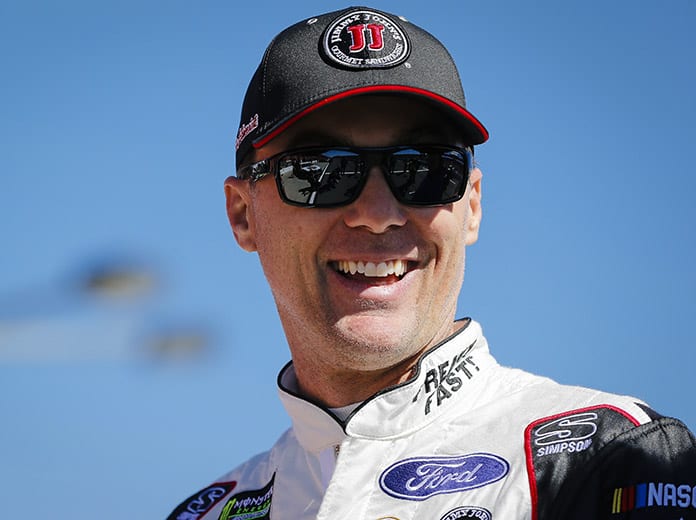
In his first full season in the Xfinity Series, Harvick scored three wins and finished third in the championship while claiming rookie-of-the-year honors. Along the way, he gained a reputation for being aggressive on the track, but off the track, his affable attitude and ever-present smile earned him the nickname “Happy.”
Harvick was set to compete full-time in the Xfinity Series in 2001 while making select NASCAR Cup Series starts for Childress’ No. 30 team. But his career path was forever altered on Feb. 18, 2001, when Hall of Fame driver Dale Earnhardt lost his life in an accident on the final lap of the Daytona 500. Days following the tragedy, Childress appointed Harvick to drive in place of Earnhardt, renumbering the famous No. 3 machine to No. 29 in time for the second race of the season at North Carolina Speedway in Rockingham. This new role was in addition to Harvick’s duties in the Xfinity Series, where he was competing for the championship.
Harvick proved he was up to the daunting task of following a legend when, in only his third NASCAR Cup Series start, he scored the victory March 11 at Atlanta Motor Speedway. As the season continued, so did Harvick’s winning ways as he claimed the checkered flag in the inaugural race at Chicagoland Speedway in Joliet, Illinois. He secured the rookie-of-the-year title en route to a ninth-place finish in the season-ending championship.
Ironically, the driver who took over the No. 30 car for Harvick was none other than Green, who competed in eight races in 2001 and ran the full Cup season in 2002 and a partial schedule in 2003.
Harvick moved to Stewart-Haas Racing in 2014 and now has 49 career NASCAR Cup Series victories, which puts him in a tie with his boss, Tony Stewart, for 14th on the all-time NASCAR Cup Series win list. Harvick’s next win will tie him with NASCAR Hall of Famers Junior Johnson and Ned Jarrett.
Childers tried out for various rides and sought opportunities that would keep him behind the wheel, but nothing materialized. In 2003, he made the difficult decision to hang up his helmet, but he wasn’t going to hang up on his dream of working in racing. Instead, Childers altered his dream. He was just as talented working underneath the hood as he was behind the wheel, so he turned his focus to working on racecars.
His road to Stewart-Haas Racing is as follows: mechanic on the No. 77 car for Jasper-Penske Racing in 2003 with driver Dave Blaney and then car chief in 2004 for driver Brendan Gaughan; in June 2005, became crew chief for Scott Riggs at MB2/MBV Motorsports; transitioned to Gillett-Evernham Motorsports from 2006-2008, serving in the same role, but taking over crew chief duties for driver Elliott Sadler in 2008; joined Michael Waltrip Racing (MWR) in 2009 to serve as crew chief of the No. 00 team and driver David Reutimann, scoring his first win as a crew chief in the 2009 Coca-Cola 600 at Charlotte (N.C.) Motor Speedway; after three years with Reutimann, which included a second win in 2010 at Chicagoland, Childers moved within MWR to the No. 55 team, where in 2012 and 2013 he was the crew chief for Waltrip, Mark Martin and Brian Vickers, guiding Vickers to the win in July 2013 at New Hampshire before departing a month later for SHR.
“Every win is special, especially your first,” Childers said. “I think when we won Charlotte – our first win at MWR – it was a rained-out race so it wasn’t really a win. It was a win to our company, but it wasn’t a win to everyone else in the garage. When we came back the next year and won Chicago and led a lot of laps and had the best car, that was probably the one that felt the best. That was almost more like the first win.
“But, to me, the greatest career achievement wasn’t a win. It was just becoming a crew chief. If there were two things I wanted to do in life, it was to either be a driver or a crew chief, and I was able to become a crew chief. To me, that’s the biggest achievement – just getting to this level and being competitive.”
Fedewa, meanwhile, drove some more Xfinity Series races and a handful of races in the NASCAR Gander Outdoors & RV Truck Series before retiring as a driver in 2006. He took his experience as a driver to the spotter’s stand and has been a mainstay at the top of grandstands for more than a decade.
